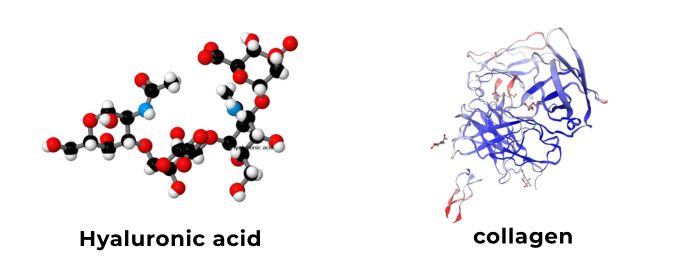
Hyaluronic acid and collagen are both essential components of the skin. But which one is more effective for skincare—hyaluronic acid or collagen? Let’s compare them.
Hyaluronic Acid vs Collagen: Skincare Effects
1. Moisturization
Hyaluronic acid: It can hold over 500 times its weight in water. A 2% pure hyaluronic acid solution can firmly retain 98% moisture. It is recognized as the best natural moisturizing substance and is called the ideal Natural Moisturizing Factor (NMF).
Collagen: It has a unique triple-helix structure that strongly locks in up to 30 times its weight in water.
☛ In terms of moisturizing ability, hyaluronic acid is far superior to collagen.
2. Anti-Aging
Hyaluronic acid: When it absorbs large amounts of water, it keeps elastin and collagen in a hydrated environment. This makes the skin more elastic and provides excellent anti-aging effects.
Collagen: It contains a unique high content of P-Hyp conversion factor. After entering the dermis, it quickly fills localized depressions in the skin, improves sagging, tightens the skin, reduces wrinkles, and smooths fine lines, thereby achieving anti-aging purposes.
☛ Both hyaluronic acid and collagen have anti-aging functions. Hyaluronic acid can be identical to the body’s natural hyaluronic acid, while collagen currently cannot achieve this.
3. Repair
Hyaluronic acid: As an external supply, it promotes the repair of damaged tissue in a short time. It enhances blood circulation in capillaries, improves the skin’s ability to adapt and respond to environmental changes, and regulates collagen synthesis through fibroblasts, reducing scar formation.
Collagen: It serves as a support and scaffold for cell growth. It induces the proliferation, differentiation, and migration of epithelial cells. During embryonic development and wound healing in adults, collagen promotes and induces the formation of epithelium.
☛ Hyaluronic acid effectively promotes the repair of damaged tissues and is widely used in skincare areas such as acne, dermatitis, and post-laser recovery. Collagen, on the other hand, has relatively limited applications.
Reading more: Hyaluronic Acid and Collagen: The Perfect Combination for Healthy Skin
Hyaluronic Acid vs Collagen: Production Methods
Hyaluronic acid: It is produced through bacterial fermentation synthesis. Its structure can be completely identical to natural hyaluronic acid in the human body.
Collagen: It is mainly extracted from animals. Even “human-like collagen” still has slight differences from natural human protein.
☛ Hyaluronic acid is clearly safer than collagen.
Reference: How is Hyaluronic Acid Powder Made
Hyaluronic Acid vs Collagen: Storage Methods
Hyaluronic acid can be stored at room temperature. Its shelf life can reach up to 2 years or even longer.
Collagen requires low-temperature refrigeration and can only be stored for up to 6 months.
☛ In terms of storage, hyaluronic acid is much more stable than collagen. It is also simpler and easier to store.
Conclusion
In the structure of the skin, hyaluronic acid provides hydration and locks in moisture, while collagen affects the skin’s plumpness. Although they differ in function, they also work synergistically—both directly influence the condition of the skin.
